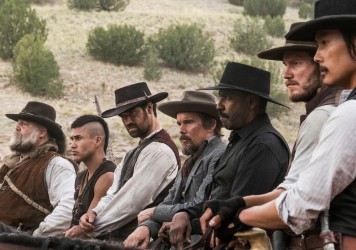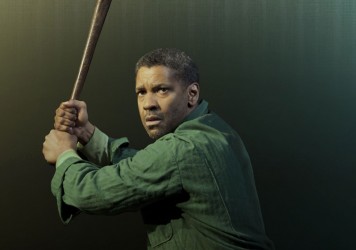A 10-step guide on how best to create the perfect revenge-based B-movie...
1. Find out what’s trending
Scan the Hollywood trades for prevailing examples in recent filmmaking trends and favourable audience responses. This will not entail harnessing upcoming talent, embracing new technology or latching onto surprise audience faves like Guardians of the Galaxy (in fact, scratch the sci-fi genre immediately – too weird and risky), but simply examining the budget-to-profit ratio of the previous year’s box-office top 20. If the numbers in the left-hand column are small and the numbers in the right-hand column are bafflingly large, then you’re already onto a winning formula.
2. Select a genre
If Step 1 has gone to plan, then you should already have a fairy clear idea of what sector (or ‘genre’, in moviemaking parlance) in which you want to build your movie. Tip: Arm-Breaking Revenge Fantasies are always popular. Revenge is simple. Revenge is universally relatable. Revenge shifts Blu-rays in Asia.
3. Location, location, location
Actually, we can subtract at least one of those location’s as there really are only two choices here. If you want to build a “classy” product, you set it in Paris and film it through a steely-blue filter. This option affords generous tax-breaks from the French government and all-but ensures saturation appeal across the lucrative European territories. If you prefer to max your home revenue streams, build your movie in a northern US town. Not New York, with its prohibitive filming permits, but somewhere like Pittsburgh or Boston. Setting it somewhere rusty and cold will give your product a dour, lived-in look that audiences often mistake for “atmosphere”.
4. Pick a title
Type the words ‘Eighties Cop Show’ into Wikipedia and see what pops up. Doesn’t matter if the most obvious titles have already been adapted into movies — get creative. 21 Jump Street creative! If they can build a movie out of Starsky & Hutch then you can build one out of Tenspeed and Brownshoe or TJ Hooker! Remember, all you’re looking for is a fondly-remembered title and a catchy theme tune, so don’t overthink this one.
5. Hire a script writer
Get the guy who wrote The Expendables 2. No wriggle-room on this point, sorry (see Step 1). If at any point he asks for guidance on the story, send him DVDs of Death Wish and Dirty Harry wrapped in a memo outlining Steps 2 to 4.
6. Develop your main character
If you’ve followed all the above steps correctly, you probably won’t need telling that your lead human asset (or “main character”) will need to be a strong, silent, decent everyman who is ultimately revealed to be a highly resourceful, military-trained berserker who can kill a roomful of tooled-up Russian mobsters with only a toothpick/beermat/shoelace. But don’t jump the gun – open slow. If he’s not an ex-alcoholic (and he really should be) then have him sitting alone in a diner every night reading ‘Moby Dick’ or somesuch. This gives him a dignity and solemnity – as well as providing what the critics call “foreshadowing” – that will lend his climactic wig-out some gravitas. (NB: this may seem like an unnecessary measure but often results in an extra star from reviewers.)
7. Call Liam Neeson
8. Liam Neeson has said no…
Not to worry. This isn’t the end of the world, just a bump in the road. Nic Cage pumps out about three of these a year, so you’ve always got an obvious and available Plan B. But ask around. Are there any other Oscar-winning actors whose onscreen career choices are becoming so drab and/or risible that they’ jump at the chance to help you build a movie (don’t say “franchise” – don’t jinx it!) such as this.
9. Choose a director
One word: solid. You’re not trying to reinvent the wheel here. You’re not trying to reinvent anything here – so make sure you pick a director who takes that fact on board. Let him play with his precious filters, film everything in near pitch-darkness and borrow his best ideas from Guy Ritchie (yes, even Guy Ritchie), but be sure it’s someone who is also fully committed to deliver their contractually-obliged quota of nail-gunnings, cork-screwings and sledge-hammerings. Also, the ability to film a confidently-staged closing half-hour of meaningless havoc set in a B&Q warehouse is essential.
10. Ditch the theme tune.
Congratulations, you have now created a profitable action movie. Please now turn to the section on unmerited, inessential sequels, Sequel To What, Exactly?
Published 15 Sep 2014
Though hardly the safe bet he once was, Denzel’s always worth a punt and this looks to be a pretty slick spin on familiar material.
Polished, elegantly shot and initially spare, The Equalizer is also artlessly structured, low on original ideas and eventually descends to routine butchery.
No great shakes but not a complete dud, this is relatively superior by-the-till DVD fodder. Faint praise, indeed.

The Magnificent Seven director offers a unique first-hand take on the acting heavyweight’s enduring appeal.

Antoine Fuqua drags the beloved 1960 all-star dad western kicking and screaming into the 21st century.

By Poppy Doran
The iconic leading man is set to bring an acclaimed stageplay to the screen.